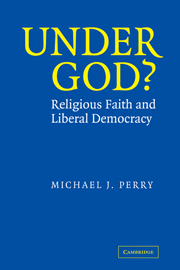Book contents
- Frontmatter
- Contents
- Introduction: The Controversy over Religion in Politics
- I Mainly for the Agnostics and the Exclusionists
- II Mainly for the Agnostics and the Inclusionists, Especially Inclusionists Who Are Religious Believers
- 4 Christians, the Bible, and Same-Sex Unions: An Argument for Political Self-Restraint
- 5 Catholics, the Magisterium, and Same-Sex Unions: An Argument for Independent Judgment
- 6 Religion, Politics, and Abortion
- Conclusion: “This Nation, Under God”
- Notes
- Index
6 - Religion, Politics, and Abortion
Published online by Cambridge University Press: 05 June 2012
- Frontmatter
- Contents
- Introduction: The Controversy over Religion in Politics
- I Mainly for the Agnostics and the Exclusionists
- II Mainly for the Agnostics and the Inclusionists, Especially Inclusionists Who Are Religious Believers
- 4 Christians, the Bible, and Same-Sex Unions: An Argument for Political Self-Restraint
- 5 Catholics, the Magisterium, and Same-Sex Unions: An Argument for Independent Judgment
- 6 Religion, Politics, and Abortion
- Conclusion: “This Nation, Under God”
- Notes
- Index
Summary
We can approach a solution of the problem of relating religious commitments to political decisions by excluding two answers. … The one wrong answer is to find no relevance at all between our faith and our political actions. This answer is wrong because it denies the seriousness of our political decisions and obscures our Christian responsibilities for the good order and justice of our civil community.
The other answer stands at the opposite extreme. It is to equate religious and political commitments and to regard every political decision as simply derived from our faith. This is a wrong answer because political issues deal with complex problems of justice, every solution for which contains morally ambiguous elements. … The tendency to equate our political with our Christian convictions causes politics to generate idolatry.
Reinhold NiebuhrThe contemporary American debate about religion in politics is animated and shaped, in part, by two large controversies that are at once both moral and political in character: the controversies over same-sex unions and abortion. Addressing the issue of religion in politics without addressing those two controversies would be like staging Hamlet without the prince. In Chapter 4, I discussed same-sex unions as a political issue for Christians; and in Chapter 5, I used the controversy over the morality of same-sex unions to frame my argument about the responsibility of Catholic citizens and legislators.
- Type
- Chapter
- Information
- Under God?Religious Faith and Liberal Democracy, pp. 98 - 123Publisher: Cambridge University PressPrint publication year: 2003



